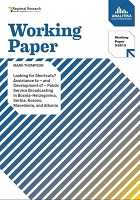Looking for Shortcuts? Assistance to - and Development of - Public Service Broadcasting in Bosnia-Herzegovina, Serbia, Kosovo, Macedonia, and Albania
Looking for Shortcuts? Assistance to - and Development of - Public Service Broadcasting in Bosnia-Herzegovina, Serbia, Kosovo, Macedonia, and Albania
Author(s): Mark Thompson
Contributor(s): Kristina Irion (Editor), Tarik Jusić (Editor), Mirela Rožajac-Zulčić (Editor)
Subject(s): Politics, Media studies, Regional Geography, Communication studies, Policy, planning, forecast and speculation, Public Finances
Published by: Analitika – Centar za društvena istraživanja
Keywords: BiH; Serbia; Kosovo; Macedonia; Albania; media; public service broadcasting; assitance; development;
Summary/Abstract: If we were asked to invent a form of media assistance which combined the maximum number of challenges, it would be hard to imagine anything more formidable than the task of establishing public service broadcasters in transitional (newly democratic) states. When those states are recovering from profound trauma or systemic breakdown, the odds against success become even greater. And when the trauma involved interethnic bloodletting on a vast scale, in which neighbouring countries were complicit, and which was ended only by external intervention by yet other countries, the chances of decisive success become incalculably small. Let me list some challenges – with no certainty that the list is complete. A public service broadcaster (PSB) produces, commissions, and disseminates a range of contents to a universal (non-niche) audience. It has to be enabled and supported by an appropriate legal and regulatory framework, one which entrusts it with a public service mission, establishes suitable mechanisms for funding and accountability while protecting it from interference by parliament and government. It needs to provide a range of programs that “inform, educate and entertain” (the famous mantra) all sectors of the population, aiming for excellence in all strands, skilful enough to blend more rarefied output with populist material, juggling the schedule to reach large audiences with high-quality news and information. It needs to be funded by a mechanism that engages the public (such as the licence fee), on a generous scale and with a stability that allows it to fulfil its mission and to invest for the future. It needs to be technically well-equipped and resourced. If it cannot deliver excellent programmes to the entire population through broadcasting and online, the public is unlikely to wish to sustain it. From all this, it follows that the providers of such assistance need to be prepared to engage on many fronts – journalistic, technical, institution-building, political – and to spend lavishly, with no expectation of rapid results. They need to have the stamina for a lengthy – perhaps endless – political and diplomatic struggle with local elites who will be reluctant to support a project that threatens to take away an important lever of influence; and with a media industry that is likely to resist this non-commercial intruder. They will need to be ready to persuade media professionals and the wider public why they should support a kind of media output which may be unknown in their own language. They will need to invest in institution-building and professionalization: training journalists, editors and managers to fulfil their distinctive mandates in a PSB. They need to provide technical assistance at a high level for producing and disseminating content on several platforms. The prospect of a strong institution devoted to public service provision in the media provokes more or less acute anxiety and resistance among the political class. The preparation and adoption of a suitable legal and regulatory framework – one that provides political and public accountability on one hand, and denies the scope for political manipulation on the other – calls for appropriate international expertise, sensitively offered, and also for dialogue with law-makers, media professionals, and civil society groups. Finally, the suppliers of such assistance must be prepared for a long and patient (but also vigilant) engagement which may fail even after the actual steps have been taken. For laws can be enacted and not implemented. Journalists can be trained only to find they are unable or disinclined to exercise their new skills in the given conditions. Outlets can be brought into existence but then fail to find a loyal audience. Codes of ethics and self-regulatory mechanisms can be introduced and fail to make an impact on actual practice. This having been said, it is obvious why the endeavour to establish PSBs in Bosnia and Herzegovina, Serbia, Kosovo, Macedonia, and Albania faced immense difficulties. The country studies in this project, “Development of Functional Media Institutions in Western Balkans – A Comparative Study”, confirm this in useful ways. They also deepen our understanding of the ways in which assistance to PSBs links with assistance to other sectors of the media.
Series: Analitika - Working Paper
- Page Count: 29
- Publication Year: 2013
- Language: English
- Introduction
- Content File-PDF

